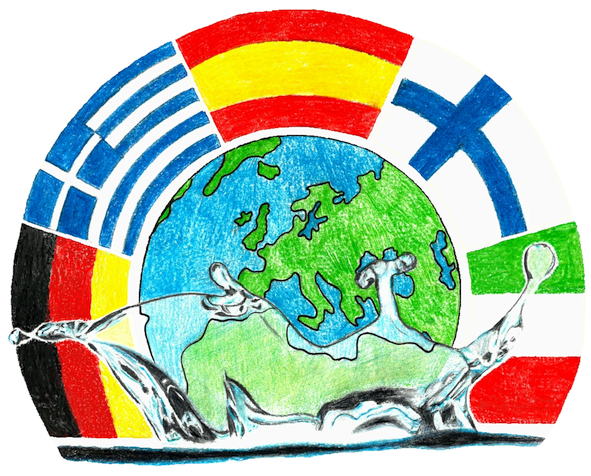Project Summary
Water is the basis of life for all people. The topic of water is probably one of the strongest connecting elements between people, which is why it is particularly suitable as a topic for a European project in which students learn with and from each other.
The five participating schools from Finland, Germany, Spain, Italy and Greece come from different natural environments and different cultural backgrounds. Based on these local specifics, we have different ways to use water, which we shall explore from a variety of angles. We believe our joint endeavour encourages mutual tolerance in a European context.
The lives of the participating students are good starting points for our joint analysis of the project theme. At the beginning of the two-year project,the participating students are in Year 9 and thus 14 or 15 years old. Increasing our students’ ability of critical thinking in dealing with ournatural resource water is the project’s major goal. Therefore, our students are going to explore our European heritage in connection with water. Moreover, all activities planned should lead to a greater understanding of systemic connections. Thus, we shall deal with five different fields of study: Art and History (module 1), Tourism and Sport (module 2), Environment and Climate Change (module 3), Water Management (module 4) and Ports (module 5), highlighting the importance of our European heritage.
Module 1, “Art and History”, is organized by Liceo Ginnasio G. B. Vico (Italy). It examines how the perception of water has changed from an artistic point of view in the different European regions over time and what the differences there are today. The 13th Gymnasium of Heraklion (Greece) is responsible for Module 2, “Tourism and Sport”. This module focuses on the recreational function of water. Changes due to predicted climate change and possible mitigation and adaptation measures in the participating regions are the focus of Module 3, “Environment and Climate Change”, headed by I. E. S. El Palmeral (Spain). Module 4, “Water Management”, analyses the vital procurement of drinking water, water as an economic factor as well as measures of protection against water. This module is organised by Europaschule GymnasiumWesterstede (Germany). Finally, the Finnish partner school, Merenojan koulu, manages Module 5, namely “Ports” as places where people have always met to trade goods or exchange ideas, and are thus central to the development of entire regions even though their role and significance may have changed over time.
Every partner school is going to set up study groups to prepare the different modules and digitally record new findings between the international project meetings. Their results are going to be compiled, discussed and edited at the international project meetings with five students and two teachers from each partner school present. The ensuing travel and mobility are likely to foster our students’ understanding of the five different cultural approaches todealing with water in the five different natural environments.
According to our research, there are no appropriate multilingual teaching resources available for such a variety of topics. Hence, we are planning to develop digital materials that can be used as free, innovative teaching and learning software – not only by the participating schools but also by other schools and individuals across Europe. In fact, we would like to develop a smartphone app called “APPlication of Water in Europe” offering a digital experience of the cultural and natural diversity of the use of water which the students will have worked upon during our project work. For example, results of a photo contest could be included in the app. Additionally, a game incorporating the contents of the various modules could be developed. The digital processing is going to be complemented by a website set up by the participating students and teachers. This way, all activities planned in connection with this project will be made available not only for a short period but rather for long-term teaching and learning worldwide.
As English is going to be employed as lingua franca throughout the project, this practice is bound to foster language learning as well as language learning awareness among students in accordance with the goals of the Common European Framework (CEF).

